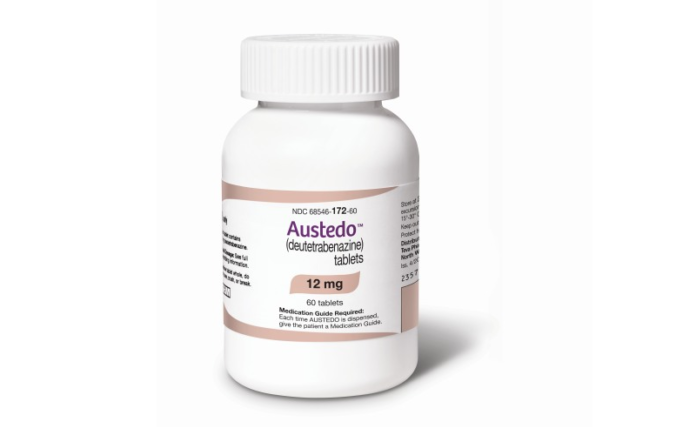TEL AVIV, Israel & PARSIPPANY, N.J.– Teva Pharmaceuticals, a U.S. affiliate of Teva Pharmaceutical Industries Ltd. (NYSE and TASE: TEVA), today announced results from the ARC-HD (Alternatives for Reducing Chorea in Huntington’s Disease) trial, an approximately 3-year open-label, single-arm, 2-cohort, multicenter extension study evaluating the safety and tolerability of long-term treatment with AUSTEDO® (deutetrabenazine) tablets for chorea associated with Huntington’s Disease (HD). The ARC-HD study was conducted by Teva in partnership with the Huntington Study Group (HSG).
ARC-HD results showed that treatment with AUSTEDO had a safety and tolerability profile comparable with the First-HD randomized, double-blind, placebo-controlled, 12-week study. In ARC-HD medication compliance rates were greater than 90% over the ~3 year open-label extension period. Over this full period, AUSTEDO improved and maintained chorea control in both the Rollover cohort and the Switch cohort, as measured by the Unified Huntington’s Disease Rating Scale (UHDRS) Total Maximal Chorea (TMC) score.1
“These data provide important insight into the long-term use of deutetrabenazine for the treatment of chorea associated with Huntington’s disease, which can have a significant functional impact on people’s lives,” said Samuel Frank, MD, Associate Professor of Neurology and Director of HDSA Center of Excellence at Beth Israel Deaconess Medical Center, Boston, and lead author of the study. “Results of this study add to the safety and tolerability profile and support deutetrabenazine as a treatment choice for this progressive condition. We are deeply grateful to the researchers, patients and their families who played an integral role in this study.”
The analysis included a total of 119 patients: 82 patients who completed the randomized, double-blind placebo-controlled First-HD trial (Rollover cohort), and 37 patients who converted overnight from a stable tetrabenazine dose to AUSTEDO with subsequent dose adjustments (Switch cohort). The average mean daily dose of AUSTEDO at the conclusion of the study was 45.7 mg. The findings were published online in CNS Drugs.
“Chorea is one of the most striking physical manifestations of Huntington’s Disease that occurs in approximately 90% of HD patients,” said Eran Harary, MD, SVP, Global Head of Specialty R&D at Teva. 2 “As a disease that can have significant functional impact on patients’ and caregivers’ lives, we’re proud to share these new data to provide valuable insights for this community of patients and for those who provide care to them each day.”
3 Year Safety Results
Exposure-adjusted incidence rates (EAIRs) were used to compare the frequency of adverse events (AEs) in this long-term open-label extension study with those in the short-term First-HD study. EAIRs related to AEs were comparable to those in the pivotal First-HD trial.
Common AEs (≥4% in either cohort) in the Rollover and Switch cohorts, respectively, included: fall, depression, anxiety, insomnia, somnolence, and akathisia. There were no new safety concerns.
3 Year TMC and Total Motor Score (TMS) Findings
The study showed that mean TMC scores decreased from baseline to Week 8 and maintained chorea control through ~3 years.
Key results include:
- In patients who rolled over from the pivotal study, from baseline to Week 8 there was a:
- 4.5-point reduction in mean chorea scores (SD: 3.1; 95% CI: –5.2, –3.7);
- 7.1-point reduction in mean TMS (SD: 7.3; 95% CI: –8.8, –5.5);
- In patients who switched overnight from tetrabenazine, from baseline to Week 8 there was a:
- 2.1-point reduction in mean chorea scores (SD: 3.3; 95% CI: –3.1, –1.0).
- 2.4-point reduction in mean TMS (SD: 8.7; 95% CI: –5.4, 0.5).
- Reductions in TMC were maintained for all subjects in both cohorts from Week 8 to Week 145 (or to the end of treatment, whichever was earlier; –0.5 [SD: 5.2; 95% CI: –1.9, 1.0]).
HD is a rare and fatal neurodegenerative disorder, affecting approximately 35,000 people in the United States.3,4 Chorea is associated with involuntary, random and sudden, twisting and/or writhing movements and is one of the most striking physical manifestations of this disease.2 Chorea can interfere with daily function, cause social isolation, and increase risk of injury, leading to decreased quality of life for patients with HD.1
1 Frank, S. Testa C, Edmondson, M. et al. The Safety of Deutetrabenazine for Chorea in Huntington Disease: An Open-label Extension Study. CNS Drugs. 2022. [to be updated upon publication]
2 A Physician’s Guide to the Management of Huntington’s Disease (3rd edition). Huntington’s Disease Society of America (HDSA) website.
3 Fisher E, Hayden R. Multisource ascertainment of Huntington disease in Canada: prevalence and population at risk.; Mov Disord. 2014;29(1):105-114.
4 Huntington’s disease: a family guide. HDSA website. http://hdsa.org/wp-content/uploads/2015/03/HDSA_FamilyGuide.pdf. Published 2016. Accessed September 2022.






